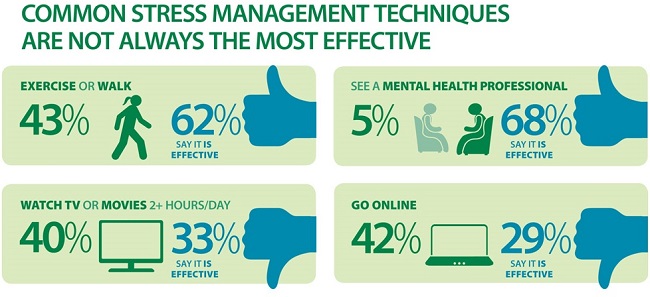
Do you feel like stress is preventing you from achieving your full potential in your work life?
When stress strikes, your brain enters ‘fight or flight’ mode – releasing a cocktail of hormones into the body to deal with the perceived threat.
This primal response is useful when in imminent physical danger but hugely counter-productive in everyday work life.
At FaxNgo we love what we do, but we know how high standards and big ambitions can cause the pressure to pile up, so we’ve compiled 8 powerful methods for dealing with work stress.
Spotting The Symptoms Of Work Stress
According to the UK’s Health and Safety Executive, in 2011/12 some 428,000 people reported “work-related stress at a level they believed was making them ill.”
Stress can affect the mind and body in numerous ways, including:
Emotional – Mood swings, irritability, loneliness, depression, and low self-esteem.
Psychological – Concentration problems, impaired judgment, anxiety, and memory issues.
Behavioral – Eating problems, poor sleeping patterns, neglecting responsibilities, and drug/alcohol abuse.
Physical – Headaches, muscle pain, nausea, chest pains, and flare-ups of preexisting medical issues.
Understand The Causes Of Your Work Stress
The problem with feeling stressed by work is that it can eventually become all-consuming, something you feel in your chest when you wake up, as you enter your office or when you see a certain name pop up in your inbox.
It’s crucial to break out of this cycle by taking a direct look at the causes of your feelings.
Try keeping a stress diary for a few weeks. Jot down when and where you felt stressed, what you were doing, how you felt emotionally and physically, and what you did about it.
Mind Tools offers a free stress diary template you can download.
This will help you work out what triggers your stress and enable you to develop ways to deal with the situation more dispassionately.
Learn To Say No Before Stress Strikes
The truth is that no matter how you deal with it, work pressure is often a fact of life. There will be times where you simply don’t have the time or support to deal properly with your workload.
This is when you need to say no. If you’re reasoning is sound and your time management is on point then the responsible thing to do is tell your manager that you can’t take on another project.
The key is to speak up early. Don’t wait until it feels like your world is crumbling around you and that you cannot possibly meet your deadline. By then it’s too late for alternative arrangements to be made and, more importantly, the work stress will already have got its claws into you.
Even the best boss won’t always have a complete picture of all of your tasks and duties. If you work in a demanding environment try to maintain a dialogue so that potentially problematic tasks and projects are identified early and you both know exactly what needs to be prioritized.
Work Smarter To Keep Stress At Bay
When stress starts to build up in your working life it can feel like you’re no longer in control.
Your mind becomes a swirl of worries about deadlines and possible outcomes and it feels impossible to start on any one task.
The important thing is to take action. Don’t think about outcomes. You may worry that you’re not doing your best work but you’ll find that as you start to tackle a task that the fog caused by stress begins to lift.
Often this comes down to improving your time management. You may never hit the fabled ‘inbox zero’ but if you prioritize your tasks properly you should start to feel that the pressure eases.
Speak Up About Your Work Stress
Talking to someone you trust will help you get a fresh view on the work problems that are stressing you out.
You’ll find that the simple act of putting your issues into words will make a world of difference to how you see things. It will help you cut through that shapeless anxiety that seems to have no beginning or end and take a clear-eyed look at the underlying issues.
As an added bonus you’ll also get advice from someone who has your best interests at heart. If you’ve ever had someone thank you genuinely for a seemingly straightforward piece of advice you’ll know that a fresh perspective can cast new light on seemingly insurmountable problems.
Meditate Your Stress Away
It’s easy to be cynical but the truth is that whatever you want to call it – meditation, mindfulness, relaxation breathing – it has a subtle yet real power to help you deal with work stress.
It’s not just a much needed pause, it will also reset your way of seeing the stressors in your life and help you deal with work pressure in a way that’s less physically and emotionally damaging.
Once you take a step back and clear your mind you’ll discover that you are not at the mercy of your feelings and that you have control.
Apps like Headspace offer great direction for your journey into mindfulness as well as a feeling of progression. I’d highly recommend the introductory course. All it requires of you is a smartphone and 10 minutes a day.
Don’t Lean On Bad Habits
The direct physiological effects of work stress can are damaging in their own right. But the real dangers, such as heart disease and obesity-related illness, come as an indirect result of the poor choices we all make while under stress.
You’re vulnerable to making poor eating choices, either because you don’t make the time to prepare healthy meals or because you turn to comfort foods to make yourself feel better.
Aside from all the major health problems that come from a poor diet you will also find yourself less physically able to deal with work pressure due to low energy levels, compromised immune functioning, and unfitness.
Even if you don’t have the time to prepare healthier meals for yourself, try to think about your meal choices ahead of time. Instead of waiting until you’re hungry before rushing for a burrito, decide at the beginning of the day what time you will break for lunch and what you will eat.
Exercise For Your Body And Mind
According to a recent study by the American Psychological Association, only 17% of American adults exercise daily. Yet its effectiveness as a stress-fighting tool is clear:
Let’s deal first with the most obvious and direct benefit of taking exercise: Your body will be physically better prepared to deal with the demands placed upon it and it will help to combat some of the physical effects of the poor lifestyle choices we make as a result of work stress.
But in my experience, the real benefit of exercise – whether going for a brisk walk or pumping iron – is the freedom it gives your mind to wander. It’s amazing how different your problems can look when you unplug your brain and focus on nothing in particular. It’s very similar to meditation.
Not only do I find myself able to see things more rationally and with less emotional intensity but it often gives me a real creativity boost that allows me to approach seemingly intractable problems from a fresh perspective.
Make Time For Yourself!
Although working hours in the US have remained relatively stable over the past decade at just under 47 hours per week, this doesn’t take into account the constant connection to work afforded by smartphones and other modern technology.
To combat stress buildup it’s important to get out of this 24-hour on-call mentality. Set a strict deadline each night after which you will not check work email or respond to work calls. Stick to it!
Use the time to try some of the other activities suggested here, or maybe read a good book. If you can, try to avoid computers and other gadgets in the hours before bed.
There are many ways that you can take action to manage and reduce your work stress but it’s important to remain conscious of the fact that it can have serious health implications. If you feel that it’s too much to handle alone, or you’re worried that you are suffering serious health issues, see your doctor..
(372)
Report Post









